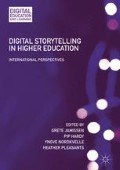Abstract
Written from a health-care perspective, the focus of this chapter is to discuss the evolving role of digital storytelling, as a research method. The chapter explores how digital stories can be viewed as a qualitative response to the “big data” approaches to research which are critical in the information age. It will suggest ways in which fuzzy logic can be used to support the transition of digital stories from learning tool into a data collection method, then into a research methodology and explore how this evolution can contribute to the emergence of a new research ideology.
Access this chapter
Tax calculation will be finalised at checkout
Purchases are for personal use only
References
Bailey-Dering, J. (2007). Getting to the bottom of things. Available at http://www.patientvoices.org.uk/flv/0110pv384.htm. Accessed 28 Aug 2015.
Bratko, I., & Šuc, D. (2003). Qualitative data mining and its applications. CIT. Journal of Computing and Information Technology, 11(3), 145–150.
Camp, G. (1996). Problem-based learning: A paradigm shift or a passing fad. Medical Education Online, 1(2), 1–6.
Cheah, P. Y., Tangseefa, D., Somsaman, A., Chunsuttiwat, T., Nosten, F., Day, N. P., & Parker, M. (2015). Perceived benefits, harms, and views about how to share data responsibly. A qualitative study of experiences with and attitudes toward data sharing among research staff and community representatives in Thailand. Journal of Empirical Research on Human Research Ethics, 10(3), 278–289.
Crenshaw, K. (1989). Demarginalising the intersection between race and sex. A black feminist critique of antidisceimination doctrine, feminist theory and antiracist policies. University of Chicago Legal Forum, 140, 139.
Crotty, M. (1998). The foundations of social research. Meaning and perspective in the research process. London: Sage.
Cueva, M., Kuhnley, R., Revels, L., Schoenberg, N. E., Lanier, A., & Dignan, M., 2015. Engaging elements of cancer-related digital stories in Alaska. Journal of Cancer Education, 31, 1–6.
Fricker, M. (2007). Epistemic injustice: Power and the ethics of knowing (p. 7). Oxford: Oxford University Press.
Glaser, B. (2007). All is data. Grounded Theory Review, 6(2). Available at http://groundedtheoryreview.com/wp-content/uploads/2012/06/GT-Review-vol6-no2.pdf. Accessed July 2015.
Glaser, B. G., & Strauss, A. L. (1966). Awareness of dying. Chicago: Transaction Publishers.
Glaser, B. G., & Strauss, A. L. (1967). The discovery of grounded theory: Strategies for qualitative research. Chicago: Aldine.
Greenhalgh, T., & Hurwitz, B. (1999). Why study narrative? BMJ: British Medical Journal, 318(7175), 48.
Gustavsson, T. K., & Hallin, A. (2014). Rethinking dichotomization: A critical perspective on the use of “hard” and “soft” in project management research. International Journal of Project Management, 32(4), 568–577.
Haigh, C. (2014). What really matters to patients? Digital storytelling as a qualitative research tool. In P. Hardy & T. Sumner (Eds.), Cultivating Compassion. How digital storytelling is transforming healthcare. Chichester: Kingsham Press.
Haigh, C., & Hardy, P. (2010). Tell me a story – A conceptual exploration of storytelling in health care education. Nurse Education Today. doi:10.1016/j.nedt.2010.08.001.
Hardy, P., & Sumner, T. (2014). Cultivating compassion. How digital storytelling is transforming healthcare. Chichester: Kingsham Press.
Heywood, A. (2003). Political ideologies. An introduction (3rd ed.). London: Palgrave Macmillan.
Hu, Y., & Bajorath, J. (2014). Learning from ‘big data’: Compounds and targets. Drug Discovery Today, 19(4), 357–360.
Hunchman, L. P., & Hinchman, S. (1997). Memory, identity and community. The idea of narrative in the human sciences. Albany: Sunny Press.
Kitchin, R. (2014). Big data, new epistemologies and paradigm shifts. Big Data & Society, 1(1), 1–12.
Kuhn, T. S. (1962). The structure of scientific revolutions. Chicago: University of Chicago Press.
Pajares, F. (1998). The structure of scientific revolutions by Thomas S. Kuhn A synopsis from the original. Available at http://www.uky.edu/~eushe2/Pajares/kuhnsyn.html. Accessed 12 Aug 2015.
Pedrycz, W. (1998). Fuzzy set technology in knowledge discovery. Fuzzy Sets and Systems, 98(3), 279–290.
Price, D. M., Strodtman, L., Brough, E., Lonn, S., & Luo, A. (2015). Digital storytelling: An innovative technological approach to nursing education. Nurse Educator, 40(2), 66–70.
Smith, P. (2014). How can the analytics on big data affect the buying trends of customers in the retail industry? Enquiry-The ACES Journal of Undergraduate Research, 5(1).
Stephenson, W. (1935). Technique of factor analysis. Nature, 136, 297.
Streptomycin in Tuberculosis Trials Committee. (1948). Streptomycin treatment of pulmonary tuberculosis. A Medical Research Council investigation. British Medical Journal, 2(4582), 769–782. doi:10.1136/bmj.2.4582.769.
Wixom, B., Ariyachandra, T., Douglas, D., Goul, M., Gupta, B., Iyer, L., & Turetken, O. (2014). The current state of business intelligence in academia: The arrival of big data. Communications of the Association for Information Systems, 34(1), 1.
Author information
Authors and Affiliations
Editor information
Editors and Affiliations
Rights and permissions
Copyright information
© 2017 The Author(s)
About this chapter
Cite this chapter
Haigh, C. (2017). ‘The Times They Are a Changin’: Digital Storytelling as a Catalyst for an Ideological Revolution in Health-Care Research. In: Jamissen, G., Hardy, P., Nordkvelle, Y., Pleasants, H. (eds) Digital Storytelling in Higher Education. Digital Education and Learning. Palgrave Macmillan, Cham. https://doi.org/10.1007/978-3-319-51058-3_9
Download citation
DOI: https://doi.org/10.1007/978-3-319-51058-3_9
Published:
Publisher Name: Palgrave Macmillan, Cham
Print ISBN: 978-3-319-51057-6
Online ISBN: 978-3-319-51058-3
eBook Packages: EducationEducation (R0)

